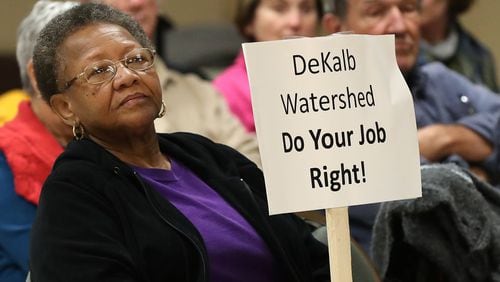To find one of the many reasons for DeKalb County’s pervasive water billing problem, dig just below the surface of sidewalks.
A decade ago, workers paved over water meters that got in the way of the construction of foot paths, leaving no way to accurately measure residents’ water consumption.
It’s confounding example of frequent missteps in a county that struggled for years to explain and address inexplicably high bills.
In blunt detail, an internal government report obtained by The Atlanta Journal-Constitution this week outlines a series of mistakes that led to many residents being overcharged. DeKalb’s government disclosed its “Water Billing Analysis Summary” in response to a request made under Georgia’s Open Records Act.
“There have been a multitude of upper-level management decisions over the years which have had the unintended effect of exacerbating real and perceived inaccuracies in water and sewer statements,” according to the report dated Feb. 1.
The report describes how policy choices have contributed to the problems since 1974, accelerating in recent years as DeKalb leaders scrambled for quick fixes:
- More than 28,000 residents haven’t been mailed bills since last fall because of a decision to withhold bills the county suspected were inaccurate. This has caused worries among residents that charges for multiple past months could be unaffordable. About 8,000 more bills that had been withheld were recently validated and sent. The number of questionable bills grew at a faster rate than billing specialists could clear them, creating a substantial backlog.
- Estimated bills became "commonplace" in 2015 because county employees couldn't double-check bills quickly enough before they had to be mailed. The increase in bills that needed to be reviewed for accuracy was caused by a management decision to verify charges that were three times higher than average. Previously, bills were only reviewed if they were five times higher than average.
- The county uses 16 different kinds of water meters, increasing risks for water consumption data entry inaccuracies because of confusion over how to read so many different types of meters.
- Water billing employees operate separately from the DeKalb Watershed Department, creating communication and coordination difficulties.
- County commissioners have raised water billing rates 213 percent since 2007, contributing to residents’ confusion over whether their bills were correct.
DeKalb employees gathered information for the report, which was never made public, last year. Its main recommendation — to address the backlog of unsent bills by mailing estimated bills until questionable amounts are verified — wasn’t adopted.
Since taking office in January, DeKalb CEO Mike Thurmond has focused on correcting inflated bills, replacing 102,000 old water meters, upgrading billing software and eliminating programming errors that at times multiplied consumption by 100. He declined to comment for this article.
“The impact we’re most concerned about is restoring trust and credibility by generating accurate water bills,” Thurmond said last month. “We’re moving in the right direction.”
Star McKenzie, who started the Unbelievable DeKalb Water Bills group on Facebook, said the report shows the depth and complexity of the county's water billing problem.
“It’s bad decisions all over the place,” she said. “There’s been a culture in place where when there’s something wrong, the county just tries to get past it. It’s putting out fires instead of getting to the root of things and fixing them.”
Besides questionable management of the county’s water metering and billing system, there are other reasons for high charges: malfunctioning meters, errors when manually reading meters, flawed consumption data, missing meters and faulty meter installations.
Thurmond has promised to repair the county’s water billing systems, saying he’s working to eliminate imprecise bills as soon as possible. But he also warns that it will take time to implement permanent fixes, including installation of new water meters and improved computer billing systems.
Timeline of DeKalb water billing problems
2007: Water meters in the way of sidewalk construction were paved over
2008: Water and sewer rates began increasing, eventually inflating bills 213 percent over seven years
2015: The county began flagging more bills for potential errors, resulting in more estimated bills being mailed
2016: About 37,000 customers’ bills were withheld because of potential inaccuracies, creating a backlog that still has been only partially cleared.
Source: DeKalb County Water Billing Analysis Summary
How we got the story
To give our subscribers the most comprehensive coverage on DeKalb’s water billing crisis, The Atlanta Journal-Constitution obtained the county’s internal report analyzing a history of government decisions that contributed to excessive charges. We obtained the report through a request under Georgia’s Open Records Act, which requires disclosure of government documents. We then reviewed the 26-page report to bring you the latest insights into the extent of the billing problem.
The AJC’s Mark Niesse keeps you updated on the latest happenings in DeKalb County government and politics. Read more:
About the Author








